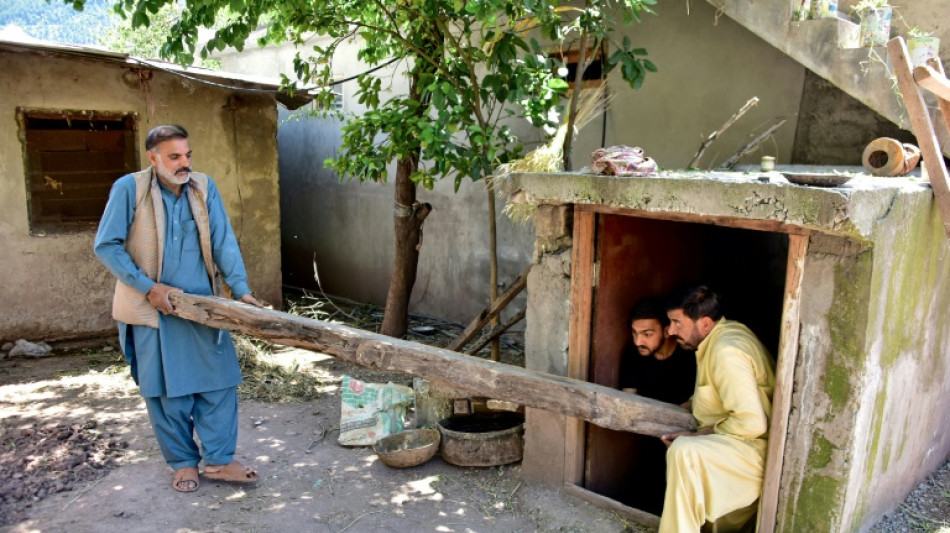
-
 Forest face 'biggest games of careers' in Champions League chase: Nuno
Forest face 'biggest games of careers' in Champions League chase: Nuno
-
Stocks waver as investors weigh earnings, car tariff hopes

-
 US climate assessment in doubt as Trump dismisses authors
US climate assessment in doubt as Trump dismisses authors
-
W. House slams Amazon over 'hostile' plan to display tariff effect on prices

-
 What we know ahead of conclave to elect new pope
What we know ahead of conclave to elect new pope
-
EU top court rules 'golden passport' schemes are illegal

-
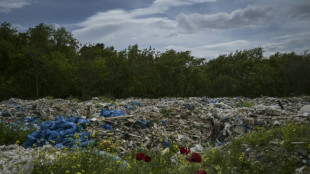 Mounds of waste dumped near Athens's main river: NGO
Mounds of waste dumped near Athens's main river: NGO
-
Spain starts probing causes of massive blackout
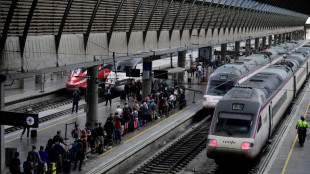
-
 France targets cheap Chinese goods with fee on packages
France targets cheap Chinese goods with fee on packages
-
Amnesty accuses Israel of 'live-streamed genocide' in Gaza

-
 Japan, Philippines leaders vow to deepen security ties
Japan, Philippines leaders vow to deepen security ties
-
AstraZeneca moves some production to US amid tariff threat

-
 Shadman's ton gives Bangladesh lead in 2nd Zimbabwe Test
Shadman's ton gives Bangladesh lead in 2nd Zimbabwe Test
-
Barca's Yamal: I admire Messi but don't compare myself to him

-
 Pfizer profits dip on lower Paxlovid sales
Pfizer profits dip on lower Paxlovid sales
-
French right-wing TV host fans talk of presidential bid

-
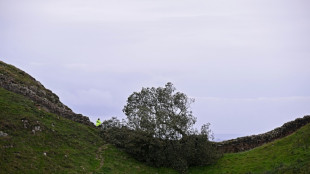 Two men in court charged with 'moronic' felling of famed UK tree
Two men in court charged with 'moronic' felling of famed UK tree
-
Amnesty accuses Israel of 'live-streamed genocide' against Gazans

-
 Spotify posts record profit in first quarter
Spotify posts record profit in first quarter
-
Sciver-Brunt named as England women's cricket captain

-
 GM profits top estimates, but automaker reviewing outlook due to tariffs
GM profits top estimates, but automaker reviewing outlook due to tariffs
-
Stock markets edge up as Trump softens tariff pain for auto firms

-
 Pricier trainers? Adidas warns on US tariff impact
Pricier trainers? Adidas warns on US tariff impact
-
Spain, Portugal rule out cyberattack for massive blackout
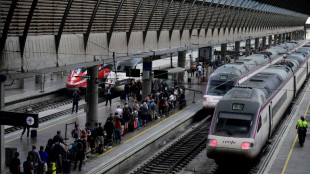
-
 Suryavanshi, 14, dubbed India's next superstar after shattering records
Suryavanshi, 14, dubbed India's next superstar after shattering records
-
Power back in Spain, Portugal after massive blackout
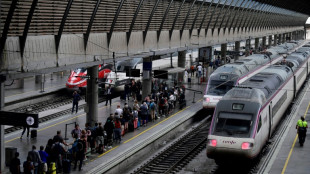
-
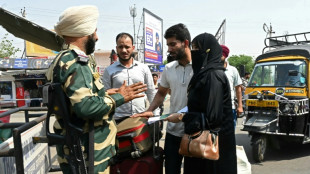 Pakistan says it shot down Indian drone along Kashmir border
Pakistan says it shot down Indian drone along Kashmir border
-
Cardinals run the media gauntlet ahead of conclave

-
 BP profit drops 70% amid pivot back to oil and gas
BP profit drops 70% amid pivot back to oil and gas
-
Iran says fire contained after deadly blast at key port
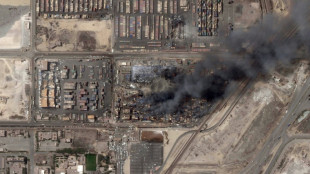
-
 Irish rappers Kneecap deny support for Hamas, Hezbollah
Irish rappers Kneecap deny support for Hamas, Hezbollah
-
Blackout plunges Spain into chaotic night of darkness
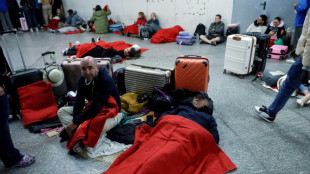
-
 Convicted cardinal confirms he will sit out conclave
Convicted cardinal confirms he will sit out conclave
-
Kashmiris fortify bunkers anticipating India-Pakistan crossfire
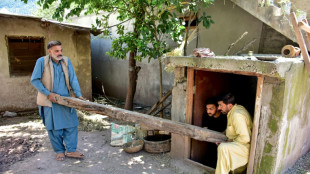
-
 Adidas warns US tariffs to push up prices
Adidas warns US tariffs to push up prices
-
Markets boosted as Trump softens tariff pain for auto firms

-
 Suryavanshi, 14, dubbed 'next superstar' after batting records tumble
Suryavanshi, 14, dubbed 'next superstar' after batting records tumble
-
Australian doubles player Purcell accepts 18-month doping ban

-
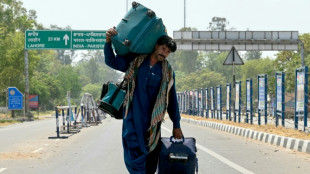 Kashmir attack unites political foes in India, Pakistan
Kashmir attack unites political foes in India, Pakistan
-
Croatia hotel toasts dizzying century of stars, sovereigns and champagne

-
 Kenya's desperate need for more snake antivenom
Kenya's desperate need for more snake antivenom
-
Les Kiss in frame with Wallabies set to name new coach

-
 Cavaliers scorch Heat, Warriors down Rockets in thriller
Cavaliers scorch Heat, Warriors down Rockets in thriller
-
Opposition wins Trinidad and Tobago election, returning Persad-Bissessar as PM

-
 Study sheds light on origin of Australia's odd echidna
Study sheds light on origin of Australia's odd echidna
-
France tries Syrian Islamist rebel ex-spokesman on war crime charges
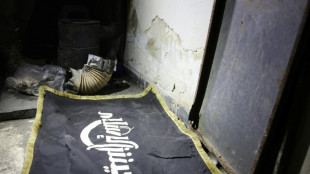
-
 Trump boasts of 'fun' 100 days, but Americans disenchanted
Trump boasts of 'fun' 100 days, but Americans disenchanted
-
Elitist no more, caviar is turning casual

-
 Amnesty accuses Israel of 'live-streamed genocide' against Gaza Palestinians
Amnesty accuses Israel of 'live-streamed genocide' against Gaza Palestinians
-
Inter slump puts season at risk ahead of daunting Barca trip


Kashmiris fortify bunkers anticipating India-Pakistan crossfire
Pulling logs and dusty building materials from a storage bunker outside his home in Kashmir, Riaz Awan readied the underground space to house his family as they braced for clashes between Pakistan and India to reach their border village.
Kashmiris living on both sides of the de facto border -- the Line of Control -- have been caught in the barrage of shells and bullets for decades as the nuclear-armed archrivals fight over the disputed region.
The long history of clashes has pushed many residents to build bunkers for shelter should their homes be caught in the crossfire.
"We've endured cross-border firing, which has been a tough experience, and we don't want our children to go through the same," Awan, a 51-year-old farmer, told AFP as he and his children cleared the bunker that had until recently stored straw.
In Chakothi village, around three kilometres (two miles) from the Line of Control, there are around 30 bunkers for a community of 60 families overlooked by Indian army check posts atop the surrounding green mountains.
- Threats every day -
Awan and his cousin Shabbir share the bunker they built in 2017, which cost them 300,000 Pakistani rupees ($1,000) -- a substantial amount in their impoverished village.
But they pulled together the funds to pay for safety.
A militant attack last week killed 26 people in Indian-administrated Kashmir, the worst attack on civilians in a Muslim-majority region in a quarter of a century.
India blamed the attack on Pakistan and accused it of "cross-border terrorism", a charge Islamabad vehemently denied.
In response, New Delhi and Islamabad downgraded diplomatic ties, withdrew visas and announced the closure of the main land border.
India says that its army has been exchanging fire with the Pakistani army for the past five days as both countries remain on edge, bracing for a potential military confrontation.
"Every day, India makes various threats, saying they will do this and that," said 52-year-old retired soldier Shabbir Awan.
"That is why we are cleaning these bunkers today, so that if needed, we can use them and make our lives safer."
Kashmir has been divided between India and Pakistan since their independence from British rule in 1947. Both claim the territory in full but govern separate portions of it.
Rebel groups have waged an insurgency in Indian-controlled Kashmir since 1989, demanding independence or a merger with Pakistan.
- 'Where else can we go?' -
Ridges and valleys intersected by the Line of Control host tens of thousands of heavily armed troops, with some rival outposts just a few dozen metres apart.
The Pakistan military says about 1.5 million residents live along the ceasefire line, long relying on a network of community bunkers and homemade shelters to weather the perennial bouts of unrest.
An average underground bunker is around 2.5 metres deep, 3.5 metres wide and 3.5 metres long. Those who can afford it reinforce all four sides with concrete, while others simply use mud walls.
"Our main concern is the safety of our children, protecting them is our biggest priority," said Saleema Bibi, a 40-year-old mother of four.
In 2017, "they even hit directly on top of our houses", she told AFP.
"We have no proper shelter or protection. We are living here -- where else can we go?" she said.
Naseema Bibi, a 46-year-old mother of four, owns a cow and two buffalos, making it hard for her to leave.
"We have livestock. We can't move anywhere," she said. So she is also working to clear a bunker.
"We are around eight families and it is difficult to adjust in one bunker," she told AFP.
"But children get panicked so we are concerned because of them."
Y.Nakamura--AMWN